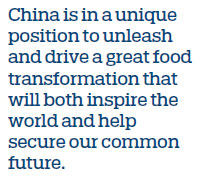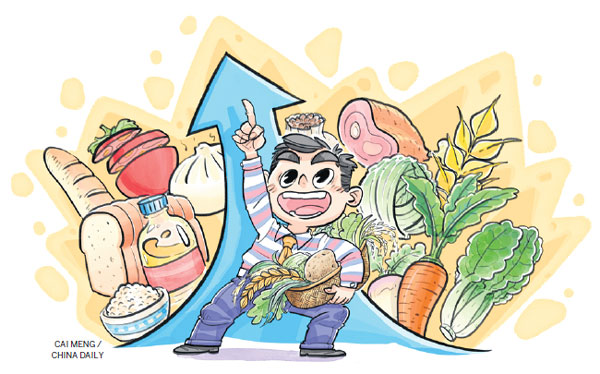More than just food for thought
China can play a leadership role in realizing a safer, more sustainable future where we can feed every one well without destroying our shared home
Alarm bells are now ringing loudly on behalf of planet Earth: We are rapidly running out of time to secure a safe future for humanity; we have a climate crisis on our hands, and the mass extinction of species is accelerating, which will have grave consequences for us as a species.
However, this is not a time for pessimism or defeatism. With leadership from the right places and with sharp focus on the most strategic levers of change, humanity can turn crisis into opportunity.
Food is one such lever. China is in a unique position to unleash and drive a great food transformation that will both inspire the world and help secure our common future.
In January 2019, the EAT-Lancet Commission on Food, Planet and Health published its scientific assessment of Food in the Anthropocene. The assessment concludes that without fundamentally transforming the production and consumption of food, we will fail to achieve the Sustainable Development Goals, we will fail to stay within 1.5 to 2 degrees of global warming, and we will not be able to slow down the extinction of species.
However, the assessment also states emphatically that food systems offer an incredible opportunity: If we start making different policy, investment and business decisions along the entire food value chain, we can unleash unprecedented progress toward a safer, more sustainable and even more prosperous future where we can feed all of humanity well without destroying our shared home.
China can play a pivotal role in this.

Looking forward, China willdue to its size and role in the global economy and path-breaking initiatives such as Belt and Road Initiative and open economy - continue to increasingly shape global supply and demand. This will also be true for food, which seen as a sector, represents no less than 30 percent of the global economy. If China sets explicit, science-based targets to guide a transition to healthy diets from sustainably produced foods, it will reverberate through the entire global food market place and most likely change it for good.
The most recent Chinese nutritional guidelines, published in 2016, provided an excellent starting point for reviewing policies and strategies across key sectors such as agriculture, fisheries, health, education, science and technology and optimizing them for healthier, more sustainable and more productive results.
China still has significant challenges when it comes to its food system: There are still pockets of undernutrition among the remaining poor. And like most of the world, it is seeing rising levels of diabetes and obesity - and associated rising healthcare costs - largely due to a shift in diets toward more meat intake and more processed and ultra-processed foods with high levels of sugar, salt and unhealthy fats.
But at its heart, the Chinese attitude to food has always been driven by the underlying principle of health and eating healthily, and China's young generation is expressing a strong interest in charting a more healthy and sustainable course when it comes to food.
Taking a more long-term historic and cultural perspective, China also brings a unique and incredibly rich culinary tradition to the global table. China's culinary history and richly adaptable and plant-heavy food is a treasure trove for the world, as we must learn to grow a much greater variety of nutritious foods from a wider variety of plants, while also learning how to produce animal-based foods responsibly and sustainably.
China's deep intellectual and spiritual wisdom in relation to food is also of enormous value, and today this wisdom is contributing real, deeply anchored content to the concept of an Ecological Civilization. This wisdom connects food to the health and well-being of humans and the world as a whole. In essence, the concepts of Yin and Yang capture and powerfully explain why human well-being and the health of our planet are in fact intimately interlinked.
It is unclear how much attention the G20 will give to the urgent global environmental crisis that we are now confronting. It is unfortunately doubtful that there will be a final communiqu�� calling for a great food transformation, although little could be more pressing and important. But the most important business is usually discussed informally on the sidelines - often around a dining table or during coffee and tea breaks - between representatives of different governments, with guests from international organizations, research organizations and think tanks and industry.
And one, two or three years later, these discussions may morph into real commitments and real actions, in some cases even shared by the entire membership, especially when one or more countries demonstrate leadership in practice.
The author is chief strategy officer of EAT, a global platform for food system transformation based in Stockholm. The author contributed this article to China Watch, a think tank powered by China Daily. The views do not necessarily reflect those of China Daily.

(China Daily Global 06/04/2019 page13)


















